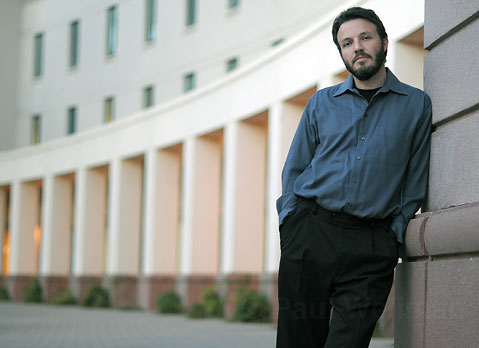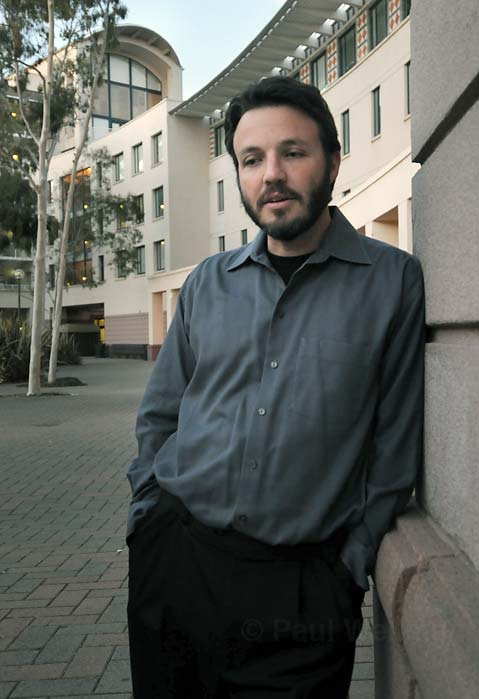The Academic Objector
UCSB Grad Student Josh Harris Teams with the ACLU to Investigate Federal Prison Laws

There are two sides to Josh Harris: the pensive scholar and the radical activist. But what makes the 33-year-old UCSB graduate student – whose pursuit for a PhD in Religious Studies is focused on the intersection of religion and law in the United States – especially unique is his ability to fuse these seemingly incongruous traits into a balanced and compelling line of work. “My goal as a student is to be able to do my academic work and take risks as an activist,” he explained, “and let them work together, as I think they should.”
This dynamic becomes clear when looking at Harris’s recent collaboration with the American Civil Liberties Union to secure information from the Bureau of Prisons (BOP) about its now-defunct Standardized Chapel Library Project (SCLP), requiring the removal of all religious materials not approved by the BOP from chapel libraries. Harris became aware of the bureau’s secretive efforts while he himself was in prison, charged with trespassing onto an army base during a protest against U.S. foreign policy. Developed in 2007 with little to no public awareness, the SCLP was enacted in the wake of reports that suggested prisons were becoming training grounds for Muslim extremists in post-9/11 America.
In 2006, Harris attended a demonstration at Fort Benning in Georgia, home of the Western Hemisphere Institute for Security Cooperation (formally known as the School of the Americas) to protest the institution’s practice of training troops from Latin America who, according to outside research, commonly become some of the worst human rights violators in the region. Along with 16 others, Harris illegally entered the base and was arrested, eventually being found guilty of a misdemeanor and sentenced to 60 days in federal prison. (At the time he was a graduate student Claremont Graduate University in Los Angeles.) He reported to Taft Correctional Facility in mid-March of 2007 with understandable unease. “I think I had probably the generic apprehensions that anybody would have going to jail – particularly being ‘not tough,'” Harris said. “But my 60 days at Taft probably ended up being one of, if not the most, meaningful experiences of my life.”
Behind bars, Harris’s eyes were opened to a number of prisoner and human rights issues. One day, he heard an offhand comment made by one of his cellmates who worked in the prison’s chapel library and had seen a memo describing the removal of certain religious materials from the library. At the time, neither man knew what it meant. “[My cellmate] certainly didn’t know it or call it the SCLP,” he said. “I don’t even know if it had a name then. But it was something to tell head chaplains at all BOP facilities, ‘Hey, this is something in the making.'” The comment stuck, but it took time for Harris to appreciate the ramifications behind the seemingly innocuous remark.
After Harris was released, he returned to his studies at Claremont and began to consider possible topics for his master’s thesis. Thinking back to his time at Taft, he recognized that the issue of religious materials in prisons provided a compelling junction between his academic interests. Once he began to compile research on the topic, Harris made a startling discovery: There was no research to compile. “That was the first thing that got me interested,” he said. “I couldn’t even find out if this policy was real, if it had been implemented, if it was an idea. It had received no academic attention. It received a very, very small amount of popular, mainstream media attention.”
Indeed, when the SCLP was implemented in the summer of 2007, the press devoted a minimal amount of attention to the suspect policy: The New York Times ran two articles, there was a piece in The Christian Century and another on NPR. That was it. Even more disturbing, most of the information available on the SCLP was published after the program was halted in September of 2007 in the wake of outcries from lawmakers and religious leaders. (Many of the confiscated texts were returned, but some were still withheld, Harris contends.) In order to compile enough information to write his thesis, Harris filed a request for documents through the Freedom Of Information Act (FOIA) with the BOP in April of this year, asking for “any/all documents that detail the reasoning behind, and implementation of, the [SCLP].”
During the six months it took for the BOP to compile the materials it eventually sent, Harris made another noteworthy observation. “One thing was very clear to me: No one had requested documents on the SCLP before,” he said. “I got the impression that they don’t immediately know what I’m talking about. I talked to a BOP researcher, and at one point he said, ‘Is this something we actually did or something you just thought we did?’ I got the idea that this is something that’s been off the radar.”
Because the SCLP was such a huge undertaking, involving all federal prisons throughout the country, Harris expected a mountain of information to work with. Instead, the BOP only provided him with four documents, three of which were essentially useless as they were memos the referenced other memos that weren’t included; no email messages, telemessages, or meeting notes were sent. However, Harris did receive the master lists of the approved materials (including texts, video, and music) that prison officials deemed appropriate for inmates. (Harris stressed the point that being on the list doesn’t guarantee a material will be available in the prison chapel library; if a text is not donated by an outside individual – as all library materials are – prisoners are simply out of luck as the BOP itself does not supply materials to its chapel libraries.)
“One of the things I would argue is that those lists show us, indirectly, the approved forms that the BOP will allow religion to take,” Harris said. “What you tend to see in the list of Islamic texts is one that avoids the more conservative, fundamental interpretation. It’s sort of the Islam we like: It’s the liberal form that doesn’t really challenge U.S. projects.” But the list, which Harris said was “a great, great thing to work with,” failed to fully illuminate the people and processes behind the SCLP. Harris was hoping for much more transparency, not only for thesis purposes but for the prison population itself that is classically devoid of the voice and rights necessary to avoid injustices done to it.
Left with a number of unanswered questions about the SCLP, Harris ran the documents he received by ACLU lawyer David Shapiro who works in the National Prisons Project. Shapiro had also represented inmates in suit against the BOP during the short time the SCLP was in effect. “He was blown away,” said Harris. “He looked at [the materials], reviewed them, and said, ‘This is a joke.'” After consulting his superiors, Shapiro and the ACLU agreed to help Harris in his FOIA undertaking free of charge.
The ACLU filed an appeal with BOP on November 12, demanding the information Harris had originally requested. “The refusal of prison officials to provide a full accounting of their rationale for banning religious material is just the latest example of an ongoing effort to secretly and unconstitutionally censor material they consider to be unacceptable,” said Shapiro in a written statement. The “ongoing effort” Shapiro spoke of is in reference to a provision Congress passed in 2008, called the Second Chance Act that allows prison officials to restrict only those materials “that seek to incite, promote or otherwise suggest the commission of violence or criminal activity.” Harris and ACLU take issue with the language used in the watered down provision, “We have a tremendous theoretical conundrum here,” said Harris. “What in our culture couldn’t be used to incite violence? There are commercials, I think, you could argue that incite violence.”

As the issue rolls on, Harris made it clear that his intentions in appealing the BOP with the ACLU’s help are not purely selfish; prisoner rights are at his mind’s forefront: “I am very concerned with prisoners’ rights. These people don’t have a voice. For me, it is truly more of a prisoner rights issue than it is a theoretical or conceptual issue. This idea that religious freedom can be guaranteed through law: That’s tricky; I don’t even know if that’s even possible. I don’t even know if we should be in the business of doing that. However, our prisoners in this country have rights and, at a very minimum, we should make sure we are guaranteeing our incarcerated population rights. So for me, that’s where I’m able to focus the project. The people in prison – I don’t want to take any agency away from prisoners – certainly rely on the people on the outside to monitor and influence policies, because they can’t.”
While he attempts to finish up his thesis, Harris says he’ll continue protesting what he views as unlawful U.S. foreign policy with the explicit intention of getting arrested and charged. “The trial is where I get a chance, on record, with the judge, with army prosecutors, and with my community in attendance, to tell my story,” he explained. “How often does anybody get a chance to talk to the army about what they’re doing?” Most recently, he was arrested at the U.S. Army Intelligence Center (where interrogators are trained) in Ft. Huachuca, AZ for, again, illegally crossing onto base territory. Charges have yet to be officially filed (including one of providing a false name after Harris told military police his name was Omar Khadr, a Guantanamo Bay detainee), and Harris hopes the charges go through so he can have his day in court. And what if the charges are dropped? “I’ll go back and get arrested again,” said Harris. “I’ve been to prison and I’m ready to go again.”



